Myll Surname Ancestry ResultsOur indexes 1000-1999 include entries for the spelling 'myll'. In the period you have requested, we have the following 17 records (displaying 1 to 10): Buy all | | | Get all 17 records to view, to save and print for £72.00 |
These sample scans are from the original record. You will get scans of the full pages or articles where the surname you searched for has been found. Your web browser may prevent the sample windows from opening; in this case please change your browser settings to allow pop-up windows from this site. Oxfordshire Charters
(1480-1489)
A large accumulation of documents preserved in the Bodleian Library, Oxford, formerly constituted the antiquarian collections of Anthony a Wood, Roger Dodsworth, Ralph Thoresby, Thomas Martin of Palgrave, Thomas Tanner bishop of St Asaph, Dr Richard Rawlinson, Richard Furney archdeacon of Surrey, and Richard Gough. A calendar of these was prepared by William H. Turner and published in 1878 under the title 'Calendar of Charters and Rolls preserved in the Bodleian Library'. The word 'charters' is here used in a rather loose sense, including virtually any manuscript or copy of a manuscript, but the bulk of the contents consists of mediaeval deeds of conveyance. Turner's calendar deals with each briefly, naming the principal parties and the nature of the deed, but hardly ever lists the witnesses. Many of these charters were undated (dating of deeds did not become general until around 1350) or so damaged or defective ('mutilated' is Turner's usual description) as no longer to display a legible date. However, he contrived, from the style of the script and/or the nature of the contents, to estimate dates in such cases. The sample scan is from the start of the Bedfordshire list. MYLL. Cost: £4.00.  | Sample scan, click to enlarge
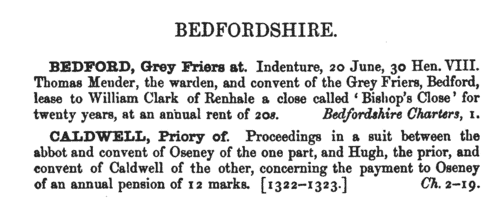
| Patent Roll 1 Henry VIII
(1509-1510)
Royal grants of all kinds were enrolled on the Patent Rolls of England. Many of these grants originated as signed bills (S. B.) or privy seals (P. S.). J. S. Brewer calendared the rolls for the first year of the reign of king Henry VIII (22 April 1509-21 April 1510) for the Master of the Rolls, including all the surviving signed bills and privy seals (some of which had never led to enrolment), in this volume published in 1862. We have reindexed this: most of the names that occur are of those granted royal offices, or wardships or ecclesiastical preferments that were in the hands of the Crown, and often the names of those whom they superseded. MYLL. Cost: £6.00.  | Sample scan, click to enlarge
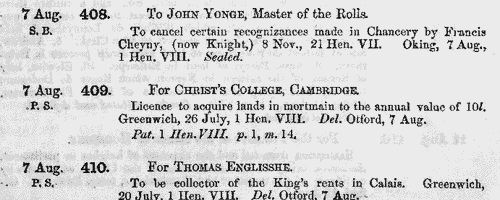
| Somerset testators and legatees
(1501-1530)
Somerset was almost coextensive with the diocese of Bath and Wells, which exercised local probate jurisdiction through its consistory and archdeaconry courts: but superior to the diocese was the province of Canterbury. Somerset testators who also had property outside the county had their wills proved in the Prerogative Court of Canterbury (PCC). The Somerset Record Society embarked on a program of publishing genealogical abstracts of the registered copy wills of Somerset testators in the PCC archives, and in 1903 (volume xvi) printed abstracts edited by the Reverend F. W. Weaver from the PCC registers 1501-1503 (register Blamyr), 1504-1506 (Holgrave), 1506-1508 (Adeane), 1508-1511 (Bennett), 1511-1514 (Fetiplace), 1514-1517 (Holder), 1517-1520 (Ayloffe), 1520-1522 (Maynwaryng), 1523-1525 (Bodfelde), 1525-1528 (Porch) and 1529-1530 (Jankyn). In addition, the volume includes abstracts of 48 Somerset copy wills in the registers of the Archbishops of Canterbury at Lambeth Palace Library from 1363 to 1491. The heading of each abstract gives the year of making the will (not the year of probate) and the testator's name in bold. Below that is the quire number and name of the PCC register. Date and details of probate are given at the foot of each abstract. Spellings of surnames are preserved as they appear in the registered copy wills, and may vary within a single document.MYLL. Cost: £4.00.  | Sample scan, click to enlarge

| Inhabitants of Stratford upon Avon in Warwickshire
(1406-1535)
The Hospital of the Holy Cross was founded in 1269; in time this fraternity became a social and religious gild. 'The Register of the Gild of the Holy Cross, the Blessed Mary and St John the Baptist of Stratford-upon-Avon' was edited by J. Harvey Bloom, rector of Whitchurch, and printed in 1907. The register is a record of admissions to the gild, an account of the fines paid by new members, and the names of those in arrear. Each year's record usually starts on the Monday after Ascension Day (the sixth Thursday after Easter), when the new aldermen, master and proctors of the gild were elected, all duly named. Then follow the admissions to the gild, including payments for prayers and candles (lights) for the faithful dead; and the names of the sureties for these payments. Interspersed with this are occasional proclamations and memoranda concerning the fraternity. A peculiarity of this publication is that the years given at the head of each page (e. g. 1502-3) are those of the regnal year (in that case 18 Henry VII) in which the Monday after Ascension Day fell. The regnal years of Henry IV, Henry VI, Richard III and Henry VII all started after that day in the calendars of 1399, 1422, 1483 and 1485; so the gild registers during those years actually cover the following year to that shown in this printed text (in that case, 1503-4).
MYLL. Cost: £4.00.  | Sample scan, click to enlarge
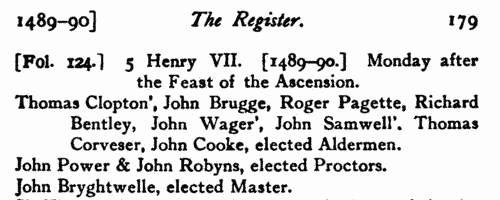
| Liegemen and traitors, diplomats and spies
(1540-1542)
The Privy Council of England dealt with many delicate and important matters of state. The surviving records date back as early as the 14th century, but Henry VIII on 10 August 1540, with the advice of the council, ordered that the council should have its own clerk 'to write, entre and registre all such decrees, determinacons, lettres and other such things as he shuld be appoynted to entre in a booke, to remayne alwayes as a leger, aswell for the dischardge of the sayd counsaillours touching such things as they shuld passe from tyme to tyme, as alsoo for a memoriall unto theim of their owne procedings'. The register from that date to 8 April 1542 was transcribed for the Commissioners of the Public Records by sir Harris Nicolas, and published in 1837. Although the council often dealt with petitions from aggrieved subjects, its main function was to oversee internal and external security.MYLL. Cost: £4.00.  | Sample scan, click to enlarge
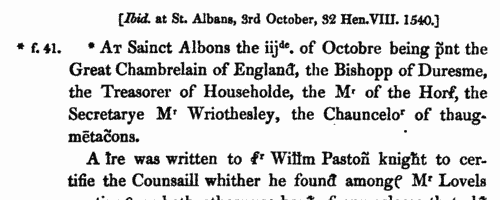
| Liegemen and Traitors, Pirates and Spies
(1542-1547)
The Privy Council of Henry VIII was responsible for internal security in England and Wales, and dealt with all manner of special and urgent matters
MYLL. Cost: £4.00.  | Sample scan, click to enlarge

| Liegemen and Traitors, Pirates and Spies
(1552-1554)
The Privy Council of Edward VI and queen Mary was responsible for internal security in England and Wales, and dealt with all manner of special and urgent matters
MYLL. Cost: £4.00.  | Sample scan, click to enlarge

| Militia in Crewkerne hundred, Somerset
(1569)
A muster of the ablemen, gunners, light horsemen, pikemen, archers and billmen available from this hundred, compiled by sir Hugh Paulet, sir Maurice Barkeley, sir Ralph Hopton and John Horner in answer to a royal commission of the 11th year of queen Elizabeth. The returns are arranged by tithing. The hundred consisted of the parishes of (the market town of) Crewkerne, Hinton St George, Marriott, Misterton, Seaborough and Wayford. (The sample shown is from the return for the borough of Axbridge)MYLL. Cost: £6.00.  | Sample scan, click to enlarge
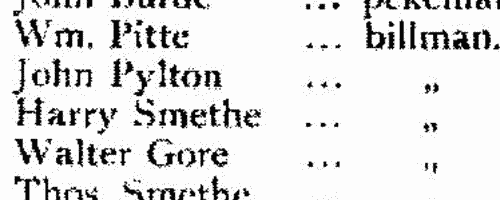
| Inhabitants of Aberdeen
(1398-1570)
Extracts from the first 27 surviving volumes of Aberdeen burgh (borough) records were made by John Stuart for the Spalding Club and published in 1844. Although it is believed that the town records were preserved on parchment rolls until about 1380, and in book form thereafter, by 1591 the town clerk remarked that there existed of the earliest records only 'peces and partis of four ald imperfyt and informall buikis conumitt and eitten be mothes, for aldnes and antiquite euill to be red, yit to be keipit for a monument be resoun of the antiquite'. The regular series of books surviving comprised 61 folio volumes from 1398 to 1745, and these contained the proceedings of the Council of the Burgh, of the Baillie Court, and the Guild Court.MYLL. Cost: £4.00.  | Sample scan, click to enlarge
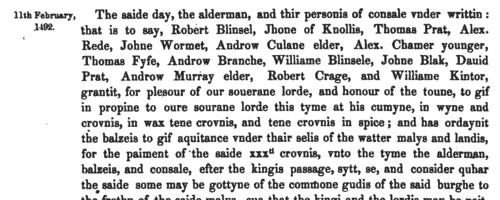
| Scottish litigants, rebels and cautioners
(1569-1578)
The Privy Council of Scotland exercised a superior judicial authority in the kingdom, and consequently received and dealt with a constant stream of petitions, as well as dealing with the internal security of the state. This register of the council from July 1569 to June 1578, in the reign of king James VI, was edited by John Hill Burton, Historiographer Royal for Scotland, and published under the direction of the Lord Clerk Register of Scotland in 1878. Some of the individuals mentioned are the complainants, those of whom they complained, and the sureties on both sides: at this period, some of the complainants are alleging serious attacks, often of a feuding nature. Many of the bonds entered into by the cautioners are promises to keep the peace towards such enemies. Failure to answer to the council when summoned was a serious contempt, leading to being denounced a rebel, with serious consequences. But 'horning' was also used in the pursuit of debts: there was no imprisonment for debt in Scotland, but a creditor could have an obstinate debtor ordered, in the sovereign's name, to pay what was due, failing which, the debtor could be put to the horn, denounced as a rebel, and imprisoned as a rebel.
MYLL. Cost: £4.00.  | Sample scan, click to enlarge

|
| 1 | 2 |  |
Research your ancestry, family history, genealogy and one-name study by direct access to original records and archives indexed by surname.
|












